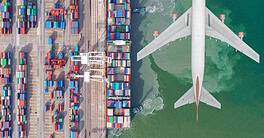Ludovic Subran, chief economist at credit insurer Euler Hermes, speaks with Andrea Fiano, editor of Global Finance, about a changed trade outlook after the US elections.

Global Finance: What will Donald Trump be able to do in his first 100 days as president, and how much of his electoral plan can be implemented?
Ludovic Subran: There are three [building] blocks to Trump’s plan. One is $1 trillion of stimulus spending on additional infrastructure and $1 trillion in tax breaks, and I think he will start implementing this block as soon as possible. The second block, he wants to lower corporate tax rates from 35% to 15%, which will go over very well with a GOP government. The third part, the most complex, is the trade part. He promised 45% tariffs on Chinese imports; he promised to renegotiate Nafta; he promised to repatriate capital to build cars and products in America. This will be where the rubber meets the road.
In the first 100 days, you need to make sure to go through every diagnostic so you are not looking like a global Jenga [a tower-building game involving stacked wooden blocks], where you are pulling out the pieces and you don’t know what is going to happen. There is still a lot of work to be done.
GF: What effect will this scenario have on trade?
Subran: Global trade has been disappointing for several years. We have lost the equivalent of the GDP of Germany of exchanged goods and services around the world. You have two major economies retreating from global trade: the US and China. If the US goes into protectionism mode, this will make it even harder for companies that have difficulty accessing a market that should be growing faster. You have to go through more hoops to get to the market. The biggest to be impacted will be small and medium enterprises. They don’t know how to handle more protectionism.
GF: What about the third pillar? Protectionism could hike trade tensions worldwide.
Subran: In terms of goods and services for physical trade, it could create lesser incentives for companies to look at the US market. You look at countries that have been protectionist in the old ways—the Turkeys, Brazils and Russias of the world, [in which] your boat enters the port and you get an additional tariff—I don’t think the US will embark on this type of protectionism. But protectionism could impact the service sector, financial services, trade-related services. The supply chains for the US go all the way from Mexico to China, so the question would be what sectors would be most important to recreate jobs and re-shore jobs here in America.
GF: Are emerging markets more at risk than anybody else?
Subran: We were expecting a big comeback from the emerging markets, because of two years of capital flight [and] depreciation of currencies. And the commodity countershock has not been positive for them. We were expecting Brazil, Argentina and Russia to do better. In China it takes three units of debt to generate one unit of growth. If the US gets stronger and more energy-independent [and builds] more infrastructure, this is not good news for emerging markets. We are looking at them in a different way than we were a few weeks ago.



